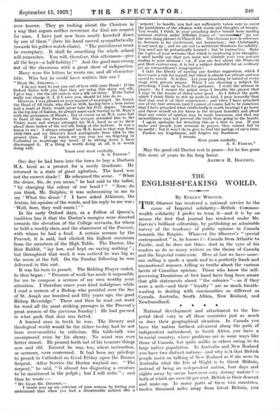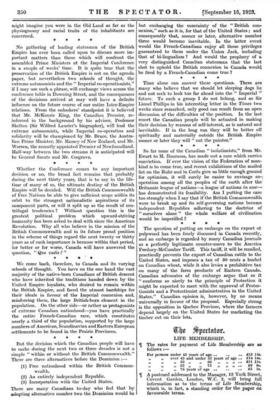THE
ENGLISH-SPEAKING WORLD.
By EVELYN WRENCH.
THE Observer has rendered a national service to the cause of Imperial solidarity—British Common- wealth solidarity I prefer to term it—and it is by no means the first that journal has rendered under Mr. Garvin's brilliant editorship, by publishing an admirable survey of the tendency of public opinion in Canada towards the Empire. Whoever the Observer's "special correspondent" is, he knows his Canada from Atlantic to Pacific, and he does not throw dust in the eyes of his readers as do so many writers on the theme of Canada and the Imperial connexion. Here at last we have some- one calling a spade a spade and in a perfectly frank and unemotional manner, telling us truths about the various facets of Canadian opinion. Those who know the self- governing Dominions at first hand have long been aware that glib statements about "the colonies "—as if they were a unit—and their " loyalty " are so much breath- wasting in dealing with communities so different as Canada, Australia, South Africa, New Zealand, and Newfoundland.
National development and attachment to the Im- perial ideal vary in all these countries just as much as does their geographical situation. In Canada you have the nation furthest advanced along the path of independent nationhood, in South Africa you have a hi-racial country, whose problems arc in some ways like those of Canada, but quite unlike in others owing to its. large native population. In Australia and New Zealand you have two distinct nations—and why is it that British people insist on talking of New Zealand as if she were to Australia what the Isle of Wight is to Great Britain, instead of being an independent nation, four days and nights away by ocean liner over very stormy waters ?- both of which are over 95 per cent. British in their descent and make-up. In many parts of these two countries, twelve thousand miles away from Great Britain, you might imagine you were in the Old Land as far as the physiognomy and racial traits of the inhabitants are concerned.
No gathering of leading statesmen of the British Empire has ever been called upon to discuss more im- portant matters than those which will confront the assembled Prime Ministers at the Imperial Conference in a couple of weeks' time. It is quite true that the preservation of the British Empire is not on the agenda paper, but nevertheless two schools of thought, the extreme autonomists and the" Imperial co-operationists," if I may use such a phrase, will exchange views across the conference table in Downing Street, and the consequences of the decisions arrived at may well have a definite influence on the future course of our entire Inter-Empire relations. From the onlookers' standpoint it is believed that Mr. McKenzie King, the Canadian Premier, re- inforced in the background by his adviser, Professor Skelton (Sir Wilfred Laurier's biographer), will lead the extreme autonomists, while Imperial co-operation and solidarity will be championed by Mr. Bruce, the Austra- lian Prime Minister, Mr. Massey of New Zealand, and Mr. Warren, the recently appointed Premier of Newfoundland. Half-way between the two streams it is anticipated will be General Smuts and Mr. Cosgrave.
* * * * Whether the Conference comes to any important decision or no, the broad fact remains that probably during the next thirty years, that is to say in the life- time of many of us, the ultimate destiny of the British Empire will be decided. Will the British Commonwealth of Free Nations be able to give sufficient scope within its orbit to the strongest nationalistic aspirations of its component parts, or will it split up as the result of cen- trifugal tendencies ? Without question this is the greatest political problem which upward-striving humanity has been asked to deal with since the American Revolution. Why all who believe in the mission of the British Commonwealth and in its future proud position in the scheme of things regard the next twenty or thirty years as of such importance is because within that period, for better or for worse, Canada will have answered the question, "Quo vadis?"
* * *
We come back, therefore, to Canada and its varying schools of thought. You have on the one hand the vast majority of the native-born Canadians of British descent who have inherited the traditions banded down by the United Empire loyalists, who desired to remain within the British Empire, and faced the utmost hardships for their ideals in favour of the Imperial connexion and, reinforcing them, the large British-born element in the population. On the other side—or rather as protagonists of extreme Canadian nationhood—you have practically the entire French-Canadian race, which constitutes nearly a third of the population, supported by the large numbers of American, Scandinavian and Eastern European settlements to be found in the Prairie Provinces.
* * a * But the decision which the Canadian people will have to make during the next two or three decades is not a simple "within or without the British Commonwealth." There are three alternatives before the Dominion :— (1) Free nationhood within the British Common- wealth.
(2) An entirely independent Republic.
(3) Incorporation with the United States.
There are many Canadians to-day who feel that by adopting alternative number two the Dominion would be but exchanging the suzerainty of the "British con., nexion," such as it is, for that of the United States ; and consequently that, sooner or later, alternative numbei! three would become inevitable. In the latter event would the French-Canadians enjoy all those privileges guaranteed to them under the Union Jack, including that of bi-lingualism ? And would the prophecy of a very distinguished Canadian statesman that the last shot to uphold the British connexion in Canada would, be fired by a French-Canadian come true ?
* * * * Time alone can answer these questions. There are many who believe that we should let sleeping dogs lie and not seek to look too far ahead into the" Imperial" future. To such a group I do not belong, and as Sir Lionel Phillips in his interesting letter in the Times two weeks since remarked, only good can result from an open discussion of the difficulties of the position. In the last resort the Canadian people will be actuated in making their decision by reasons of self-interest, as is natural and inevitable, If in the long run they will be better off spiritually and materially outside the British Empire sooner or later they will "cut the painter."
* * a * So far none of the Canadian "isolationists," from Mr. Ewart to M. Bourassa, has made out a case which carries conviction. If ever the vision of the Federation of man- kind is to come true, and recent exhibitions of the mailed fist on the Ruhr and in Corfu give us little enough ground for optimism, it will surely be easier to envisage co- operation among all the peoples of the earth after the Britannic league of nations—a league of nations in esse—' has demonstrated its feasibility. Am I putting the ease too strongly when I say that if the British Commonwealth were to break up and its self-governing nations become independent Republics adhering to the doctrine of "ourselves alone" the whole welfare of civilization would be imperilled ? * * * * The question of putting an embargo on the export ot pulpwood has been freely discussed in Canada recently, and an embargo is regarded by many Canadian journals as a perfectly legitimate counter-move to the_ America Fordney-McCum.ber Tariff. This tariff, it will be recalled, practically prevents the export of Canadian cattle to the United States, and imposes a tax of 80 cents a bushel on Canadian wheat, while it also levies a prohibitive tax on many of the farm products of Eastern Canada. Canadian advocates of the embargo argue that as it "conforms so nicely to the principle of Protection it might be expected to meet with the approval of Protec- tionists and a Protectionist administration in the United States." Canadian opinion is, however, by no means universally in favour of the proposal. Especially strong is the opposition in Quebec Province, where the farmers depend largely on the United States for marketing the timber cut on their lots.



































 Previous page
Previous page